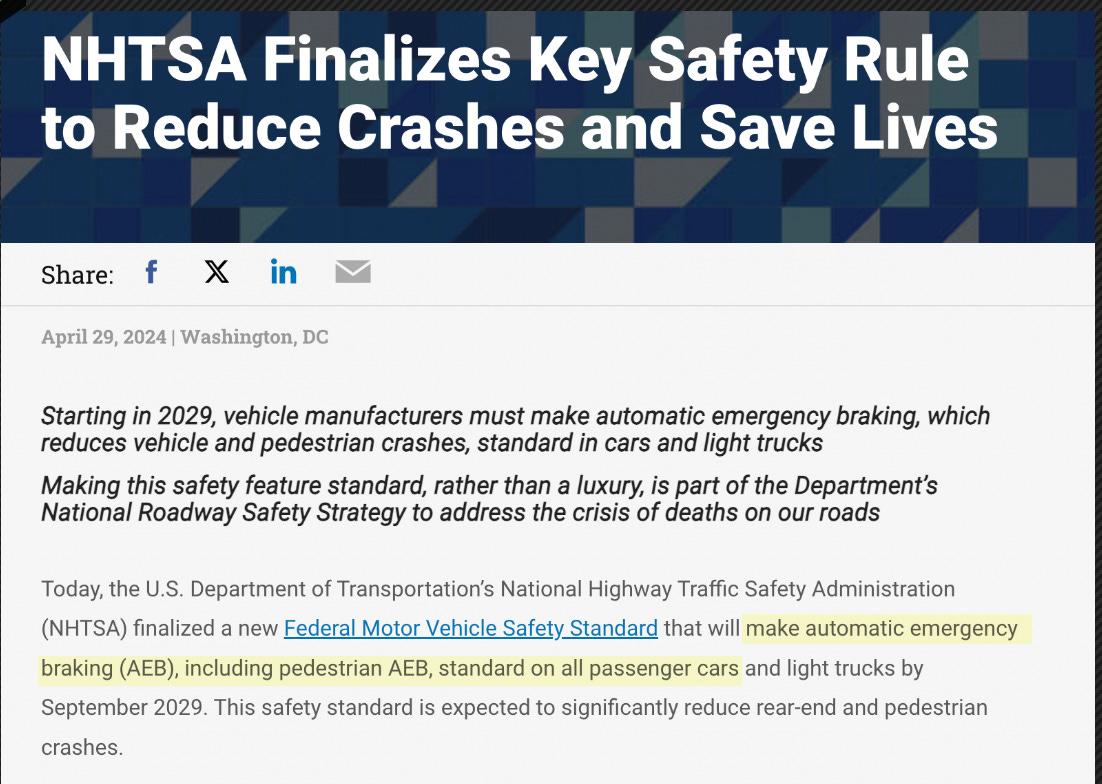Transportation Technology Legislation -Bad News Bear
Just some thoughts. It was nice to write an article and take a break from my book for a moment.
A few days ago, I was watching PBS when a story caught my attention. It covered injuries suffered by children and pedestrians due to vehicle impacts. Strangely, the story didn’t focus on why kids end up in such dangerous situations to begin with, as if perhaps it weren’t perhaps possible to teach children how to safely cross a street.
The coverage instead centered around potential government mandates which would require all newly manufactured vehicles to be equipped with technology with the ability to override the control of civilian drivers using AI and satellite connectivity. As for the risks of this technology being abused ? Not a word.
Of course, disingenuous content from PBS is to generally be expected.
If the government genuinely cared about the safety of children, it wouldn’t have restricted access to parks, playgrounds, and schools during the COVID-19 pandemic. Nor would it have required them to wear masks that limited their oxygen intake and hindered nearly every aspect of their development.
Instead of focusing on children’s well-being and solving the very real problems they caused, the government-influenced media zeroes in on vehicle regulations which aim to alter the standards of the auto industry, putting thousands of Americans out of work and consolidating its economy into the hands of a small group of companies specializing in electric vehicles. Little attention is given to reversing the harm caused by increasingly invasive global mandates in regards to public transportation.
On the House floor, where money is decidedly spent on unnecessary wars, almost nothing is said for the people of Donetsk and Luhansk or Palestine and Syria. Nothing is said of Afghanistan or of any other place where lives and property have been destroyed by U.S. tax dollars. Little, if anything, is said of the many Americans who are suffering on domestic soil due to large-scale initiatives of pharmaceutical companies and a justice system that is anything but just—the rise of popular support for Kamala Harris, a known ‘executioner’ of the nations’ most vulnerable and poor, proves the point, as does the existence of the military-industrial complex laying American money into the hands of corrupt organizations. All of this with no vote from the citizens in the Land of Democracy™.
Circling back to automotive regulations, documents like the Special Investigation Report by the National Transportation Safety Board and the Global Technical Regulations from the United Nations confirm that international governing bodies prioritize control over human welfare.
By leveraging the average person’s genuine concern for safety, governing bodies use tragic yet commonplace accidents as a gateway to push legislation providing governments and corporations with unprecedented access to private vehicle, allowing authorities to determine the location of everyday drivers as well as creating the possibility to alter vehicles’ operability. Such policies are already being implemented in the European Union. Mandated black-boxes, speed-regulation components, and installed artificial intelligence software will be required for all new automatic vehicles.
Considering the rise of facial recognition being used by governments all over the world, these developments call for justified concern. Anyone interested in the subject may find previous articles regarding the development of U.S.-funded surveillance tools, such as Ukraine’s 'Neuroidentigraf,’ of some interest. These rapidly evolving technologies enable near-omnipresent surveillance.
For those without financial resources necessary to acquire newly manufactured tech-regulated vehicles, these policies produce another area of concern. Not only could the lower class face legal repercussions for minor and arbitrary infractions, but their freedom of movement could be constrained, limiting essential access to work, social spaces, and the ability to spend time with their family. Such restrictions are even more alarming when one considers the impact they have on children who suffer from the inability of their families to travel within the law.
If children are confined to learning through screens instead of essential social interaction, what future are we building? If parents lose their license to drive, their freedom (talking about jail here), or access to their vehicle altogether, what future are we building?
Who benefits?
Proposed regulations threaten to erode people’s ability to work. Whether it’s explicitly protected by the Constitution or not, the freedom to find and try your best to maintain a job is an innate human right. Though I’m no particular fan of the U.S. Constitution, (you can read my thoughts on that here), it does appear that the First and Fourteenth Amendments acknowledge this fundamental right to work and personal liberty. Without reliable transportation, holding down a job in the U.S. is close to impossible.
This is especially true in rural areas, which make up the majority of the country and even some of the largest American cities lack sufficient public transit. This leaves lower-income individuals excluded from job opportunities that they otherwise might have access to. As a result, it is all too common for them to be forced into poverty, hunger, and homelessness. This isn’t just a personal burden—it’s a systemic flaw that only increases the division that is currently tearing at the fabric of our society. Especially in an election year, I believe it’s safe to say that we all feel the tension—and although one might argue that taxpayers bear the cost, the truth is that only a small fraction of collected tax dollars reaches our nation’s most vulnerable populations.
As regulations increasingly prioritize federal control over human welfare, citizens have to critically evaluate the implications of transportation policies and the damage that may be inflicted on the European and American public. If we continue to allow legislative measures that limit peoples’ mobility and their access to opportunities, then we risk deepening the very divides which we claim to oppose. Worse, we neglect the needs of our most vulnerable citizens and simply throw them into the streets.
Pay attention.
-The Shultz Report by M. Shultz




